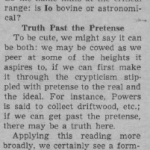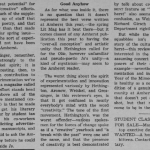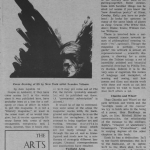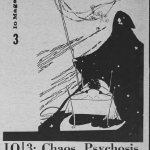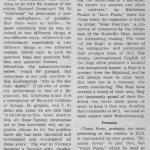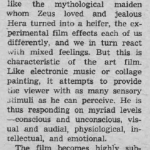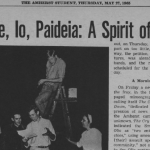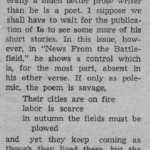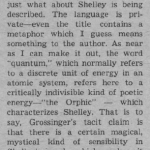A collection of articles from the Amherst Student, tracing Io‘s previews and reviews, as well as its editors’ responses. For comparison, a few articles concerning the more “established” and conventional Amherst Literary Magazine are also included.
Anticipation
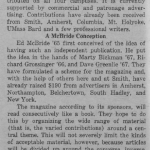
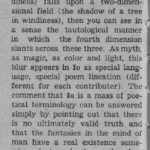
Previews of Io: conception, one week before first issue
- “An unusual campus publication”
- “Io is a mass of poetical terminology”
- “The magazine…will read consecutively like a book”
- “[A]rticles will be divided up around the converse, inverse, and corollaries of the central theme”
- “Full range of material from the inexplicable terms of our fighting in Southeast Asia to the examination of a recurring comet”
- “Fancy Style Frowned Upon”; “[the editors]” would consider highly any writing that was clearly understandable by both the person who wrote it and the person who is being asked to read it”
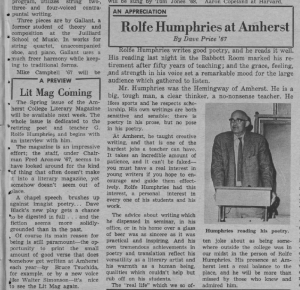
A preview of Spring Lit Mag, dedicated to Rolfe Humphries
- “Impressive effort”; accompanied by an appreciation article for Rolfe Humphries
- Chairman Fred Aronow ‘67 “looked around for the kind of thing that often doesn’t make it into a literary magazine, yet somehow doesn’t seem out of place”
- “The main reason for its being is still paramount- the opportunity to print the small amount of good verse that does somehow get written at Amherst each year”
Reviews and responses
Positive:
“It carries apparently literary forms into areas of such strangeness, complexity, and, I think, interest, that it bears closer scrutiny than it probably has received here. And it won’t be here for long.” (Regarding Grossinger and Hough bringing it to Michigan after Amherst)
“Io is on the lookout for metaphors; it is an attempt to bring together art and writing, treating materials (themes, kinds of ideas) which are not really strange to us, through the use of, and as transfigured and made new by, a confluence of strangely different languages. Unusual correspondences and associations have resulted.”
“Io exists in the twilight area between the most abstract of physics and mathematics and the metaphorical systems of true poetry.”
Negative:
“A psychic disorder, that’s what it is. Io-3, the third issue of Richard Grossinger’s dimension-smashing magazine, has smashed out of our dimension.”
“It is unfortunate, however, that Grossinger’s stylistic route to an answer is strewn with vapid metaphors, prurient similes, and glib allegories. It just ain’t good writing… We are dragged from our positivistic isles to the nirvana of a psychic Milkey Way, but we are dragged by grating prose, and we are abused.”
“There are times when the magazine is worth its dollar. [‘Hopi Hearings’] is clear, devoid of the ambiguities and pretensions that strangle most of Io-3.”
“To steal one of Grossinger’s phrases, we may conclude that ‘they came somehow pathetically to participate in a matter of significance (for they could find no significance in matter)’ but they could not deal significantly with anything, let alone matter.”
Grossinger’s Response to Richard Kelly’s review:
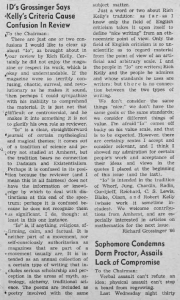
“Io is a clear, straightforward journal of certain mythological and magical themes; it comes out of a tradition of science and poetry not studied at Amherst, but the tradition bears no connection to Dadaism and Existentialism.”
“Io is, if anything, religious, affirming, calm, and factual. It is neither part of a movement, nor self-consciously authoritarian as magazines that are part of a movement usually are.”
“It is intended as an annual collection of a certain type of writing that includes serious scholarship and perception in the areas of myth, astrology, alchemy, traditional science.”
Addressing Richard Kelly’s training and tradition: “As far as I know only the field of English criticism takes it upon itself to define ‘nice writing’ from an ethnocentric point of view… We don’t consider the same things “nice;” we don’t have the same goals or the same standards; we consider different things of value.”
Other articles on Grossinger, Io, and Phi Psi
Inside Io ← BACK NEXT → Beyond Amherst
Overview of Literary Magazines
Of Moons and Serendipity: the conception
Inside Io: mission statement, Io-1
Eyes on Io: the reception
Io after Amherst: post-Amherst transformation
Bibliography
Project by Phuong-Nghi Pham ’18
